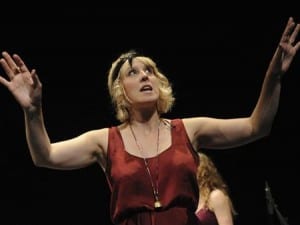Stage Management
‘The stage management team forms a vital nerve centre, bringing together all the production technical departments, commonly known as the stage departments. Stage management needs to be fluid, dealing with every task, situation and person that may come their way’ (2001, p. 16).
Copley and Killner’s description of stage management sums up in just two sentences what it is all about. A stage management team is responsible for bringing the show together, with the stage manager at the centre of the of the web of communications. A stage manager holds many responsibilities, that may be required differently for each production they approach. Daniel Bond states that ‘nothing in this industry is written in stone, for the requirements of every production are different’ (1991, p. 11). This makes it clear that a job within stage management will always bring new ideas, concepts and problems to whoever takes on the task. For a person wishing to pursue this career, Daniel Ionazzi summarises the qualities of a good stage manager in these words:
‘A Stage Manager is a LEADER, who is SELF-MOTIVATED and EVEN-TEMPERED, with the ability to ANTICIPATE and ADAPT to constantly changing conditions. Stage managers are DEDICATED to and RESPONSIBLE for every aspect of their productions without losing their SENSE OF HUMOUR. They provide an EFFICIENT and ORGANIZED work environment while remaining EMPATHETIC to the people and the process’(1992, p. 11).
It is evident that the job of stage manager is not one to be taken on lightly, it requires a lot of patience, organisation, time and empathy to ensure that the end production is a success. I hope that as stage manager for Progeny Theatre Company, I can excel in completing these tasks. I believe as a person, I am quite a dedicated team player, always wanting to help others and make sure people are on the right track. These qualities should help me to ensure the well-being and safety of each member of the company.
Alex Urbanczyk
Word Count : 327
Works Cited:
Ionazzi, D., (1992) The Stage Management Handbook. USA: Betterway Books.
Bond, Daniel. (1991) Stage Management A Gentle Art. London: A&C Black (Publishers) Limited.
Bond, Daniel. (1991) Stage Management A Gentle Art. London: A&C Black (Publishers) Limited.

